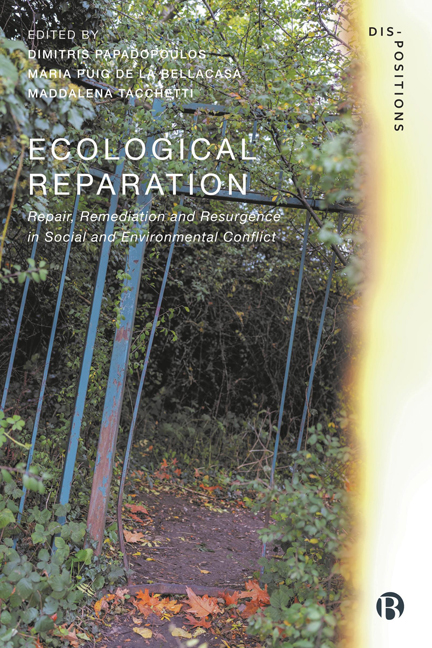Book contents
- Frontmatter
- Contents
- List of Figures
- Notes on Contributors
- Acknowledgements
- Note on the Figures
- Dis-Positions Series Preface
- Introduction: No Justice, No Ecological Peace: The Groundings of Ecological Reparation
- PART I Depletion<>Resurgence
- PART II Deskilling<>Experimenting
- PART III Contaminating<>Cohabiting
- PART IV Enclosing<>Reclaiming Land
- PART V Loss<>Recollecting
- PART VI Representing<>Self-governing
- PART VII Isolating<>Embodying
- PART VIII Growth<>Flourishing
- Index
2 - Hesitant: Three Theses on Ecological Reparation (Otherwise)
Published online by Cambridge University Press: 28 March 2024
- Frontmatter
- Contents
- List of Figures
- Notes on Contributors
- Acknowledgements
- Note on the Figures
- Dis-Positions Series Preface
- Introduction: No Justice, No Ecological Peace: The Groundings of Ecological Reparation
- PART I Depletion<>Resurgence
- PART II Deskilling<>Experimenting
- PART III Contaminating<>Cohabiting
- PART IV Enclosing<>Reclaiming Land
- PART V Loss<>Recollecting
- PART VI Representing<>Self-governing
- PART VII Isolating<>Embodying
- PART VIII Growth<>Flourishing
- Index
Summary
The bude can only exist if winkas change their way of thinking.
Juan Roa Antileo, Werken of the Lafkenche community of ChilcocoAct of stammering. To be irresolute. To be undecided. In times of emergency and crisis, when the world crumbles and life is pushed to the brink of the impossible, to hesitate is second to irresponsibility. Perplexity was an exercise that we could indulge ourselves into back when the catastrophe was a future-to-come, somewhere, eventually. Today, when ecological breakdown is reorganizing the distribution of life and death, hesitation is ethically inappropriate and politically banal.
And yet, here we are, hesitating. I am not thinking generically. My ‘we’ is a very specific one. It refers to the sociocultural aggregate that for the lack of a better category it could be called ‘white people’. Or maybe it is ‘Western scientists’. Or both. In any case, those that have self-categorized themselves as the other of the Other, the other of the ‘Indigenous’. So, what I’m trying to situate is the moment in which, in times of heightened ecological sensitivity, ‘we’ stumble. And not because we find ourselves allowing climate deniers to perforate our principles and convictions – but because we meet the alterity against which we assert ourselves, with our convictions and their enemies; we meet other ways of defining what ecology means and how reparation is done, other ways of delimiting life from death, other modes of practicing time and grief. An ecological reparation otherwise.
Hesitation, for me, has unravelled partaking in the efforts of Likanantai and Mapuche communities to heal lands, waters and atmospheres damaged by settler-colonialism. In the presence of their narrations about and practices to repair wetlands, forests, oceans, and soils damaged by extractivism, I have stammered. I have stepped back. I have mumbled, at odd, confronting modes of organizing biotic and abiotic life in ways that defy my imagination. Other forms of existence, other chronologies and teleologies that mess up with (my) well-defined questions and answers. I like the image of hesitation because it moves away from the eventfulness and determination of the conflict. What I have experienced doing ecological reparation in the Salar de Atacama or Tubul-Raqui, rather than a clash of convictions, is a doubt.
- Type
- Chapter
- Information
- Ecological ReparationRepair, Remediation and Resurgence in Social and Environmental Conflict, pp. 37 - 49Publisher: Bristol University PressPrint publication year: 2023

